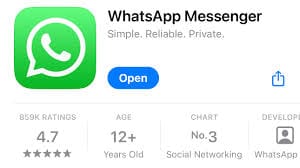WhatsApp Messenger download
In the ever-evolving landscape of digital communication, few platforms have achieved the global dominance and versatility of WhatsApp Messenger. Launched in 2009 by Brian Acton and Jan Koum, this application has transformed how individuals and businesses connect, offering a seamless, secure, and cost-effective way to communicate across borders. With over 2 billion users in more than 180 countries, WhatsApp has become a cornerstone of modern communication, bridging gaps between personal conversations and professional interactions. This article explores the rise of WhatsApp, its accessibility through WhatsApp Messenger download, and its growing significance in the realm of WhatsApp Messenger download, highlighting its features, impact, and future potential.

The Rise of WhatsApp Messenger
WhatsApp’s journey began as a simple idea: to create a messaging platform that leverages internet connectivity to bypass traditional SMS costs. Unlike conventional texting, which often incurred per-message fees, WhatsApp offered free text, voice, and multimedia messaging, making it an instant hit among users seeking affordable communication solutions. Its cross-platform compatibility, supporting Android, iOS, Windows, and even basic feature phones, further fueled its adoption. By 2014, WhatsApp’s meteoric rise caught the attention of Meta (then Facebook), leading to a $19 billion acquisition that solidified its position as a global leader in messaging.
The appeal of WhatsApp lies in its simplicity and reliability. Users can send text messages, voice notes, images, videos, and documents with ease, all protected by end-to-end encryption. This security feature ensures that only the sender and recipient can access the content, making WhatsApp a trusted platform for personal and sensitive communications. Additionally, features like group chats, voice and video calls, and status updates have kept users engaged, fostering a sense of community and connection.
Accessing WhatsApp Messenger download: The Ease of WhatsApp Messenger Download
One of the key factors behind WhatsApp’s widespread adoption is its accessibility. The process of WhatsApp Messenger download is straightforward, available through major app stores like Google Play Store, Apple App Store, and Microsoft Store. For users with older devices or limited internet access, WhatsApp also offers lightweight versions and support for feature phones, ensuring inclusivity across diverse demographics. The app’s minimal storage requirements and low data consumption make it ideal for regions with limited connectivity, such as rural areas in Africa, Asia, and Latin America.

To WhatsApp Messenger, users simply search for the app in their device’s app store, install it, and verify their phone number to activate their account. This user-friendly setup eliminates barriers to entry, allowing people of all ages and technical backgrounds to join the platform. Regular updates ensure that WhatsApp remains compatible with the latest operating systems while introducing new features, such as payment integrations and enhanced privacy settings. For businesses, downloading WhatsApp is the first step toward leveraging its powerful tools for customer engagement, as we’ll explore next.
WhatsApp Messenger download: Revolutionizing Customer Engagement
In 2018, WhatsApp introduced WhatsApp Messenger Business, a dedicated version of the app designed to empower small and medium-sized enterprises (SMEs) to connect with their customers. This platform has since become a game-changer for WhatsApp Messenger download, offering tools to streamline communication, enhance customer service, and drive sales. Unlike the standard WhatsApp app, the Business version includes features tailored to professional needs, such as automated responses, business profiles, and messaging analytics.
A WhatsApp Business account allows companies to create a professional presence with a verified profile, including their logo, contact details, website, and operating hours. This transparency builds trust with customers, who can easily verify the authenticity of the business they’re interacting with. Automated features, such as greeting messages and quick replies, enable businesses to respond promptly to inquiries, even outside regular hours. For example, a customer messaging a bakery about cake options might receive an instant reply with a menu link, saving time for both parties.
The Business app also supports catalog creation, where businesses can showcase their products or services directly within the app. This feature is particularly valuable for e-commerce, as customers can browse items, ask questions, and place orders without leaving the chat interface. In regions like India and Brazil, where WhatsApp is a primary communication tool, businesses have reported significant sales growth by integrating catalogs and payment options, such as WhatsApp Pay.
Another powerful feature is the ability to send transactional messages, such as order confirmations, shipping updates, and appointment reminders. These notifications keep customers informed and reduce the need for follow-up calls or emails. For instance, a salon can send a reminder for an upcoming appointment, complete with a link to reschedule, enhancing customer convenience. Larger enterprises can leverage the WhatsApp Business API to integrate the platform with their customer relationship management (CRM) systems, enabling scalable, personalized communication.
The Impact of WhatsApp on Global Communication
WhatsApp’s influence extends far beyond individual conversations and business transactions. It has reshaped how communities interact, from family group chats to grassroots movements. In countries with high mobile penetration but limited broadband access, WhatsApp serves as a lifeline for staying connected. Its low data usage allows users to send voice messages or make calls even on 2G networks, making it a vital tool in emerging markets.
For businesses, WhatsApp has democratized customer engagement. SMEs, which often lack the resources for sophisticated marketing campaigns, can now compete with larger brands by using WhatsApp’s free tools. A street vendor in Nigeria, for example, can advertise their wares to a local WhatsApp group, while a boutique in Indonesia can take international orders through the Business app. This leveling of the playing field has spurred entrepreneurship and economic growth in underserved regions.
However, WhatsApp’s ubiquity has also raised challenges. The platform has faced scrutiny over misinformation, particularly during elections and public health crises. To address this, WhatsApp has implemented measures like message forwarding limits and fact-checking partnerships. Privacy concerns have also emerged, especially following Meta’s data-sharing policies. Despite these issues, WhatsApp’s commitment to end-to-end encryption and user control over privacy settings continues to reassure its user base.
The Future of WhatsApp Messenger and WhatsApp Messenger Business
As WhatsApp evolves, its potential for innovation remains vast. For individual users, upcoming features like AI-powered chat assistants and enhanced multimedia editing tools promise to enrich the messaging experience. For businesses, WhatsApp is poised to deepen its integration with e-commerce and financial services. In markets like India, where WhatsApp Pay is gaining traction, the app could become a one-stop platform for communication, shopping, and payments.

The WhatsApp Business API is also expected to expand, enabling more sophisticated automation and analytics for enterprises. This could transform WhatsApp into a central hub for customer service, rivaling traditional call centers and email support. Additionally, WhatsApp’s focus on sustainability, such as reducing server energy consumption, aligns with global demands for eco-friendly technology.
Conclusion
WhatsApp Messenger has redefined communication, offering a versatile platform that serves both personal and professional needs. Its accessibility through WhatsApp Messenger download ensures that anyone with a smartphone can join the global conversation. Meanwhile, WhatsApp Messenger Business empowers entrepreneurs and enterprises to build stronger customer relationships, driving economic growth and innovation. As WhatsApp continues to evolve, its ability to adapt to user needs while maintaining simplicity and security will cement its place as a cornerstone of digital communication. Whether connecting loved ones or closing business deals, WhatsApp remains a powerful tool for bringing people together in an increasingly connected world.